|
|
|
Sort Order |
|
|
|
Items / Page
|
|
|
|
|
|
|
| Srl | Item |
| 1 |
ID:
122012
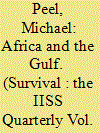

|
|
|
|
|
| Publication |
2013.
|
| Summary/Abstract |
Gulf states and sub-Saharan African countries have begun to forge closer economic ties over the past few years. This process, amid financial crisis in the West and strong growth in Africa, provides a platform for an important new inter-regional geopolitical power play.
|
|
|
|
|
|
|
|
|
|
|
|
|
|
|
|
| 2 |
ID:
122011


|
|
|
|
|
| Publication |
2013.
|
| Summary/Abstract |
Africa is booming. Of that, there is little doubt. One feels it every time one lands in Lagos, Addis Ababa, Nairobi or Accra. Hotels are filled to the brim and business-class seats are sometimes hard to come by. Companies are struggling to fill executive positions because they are growing so rapidly. The energy on the streets is palpable, and the rest of the world is noticing. A recent issue of the Economist, for example, led with an article on 'Aspiring Africa' and included an advertisement for an Africa-focused conference in Dubai.1 This followed the first The Times CEO Summit Africa, held in Geneva earlier this year, and the first New York Forum Africa, which took place in Gabon in 2012 and brought over 500 global business leaders to the tiny West African nation. Events such as the IISS forum 'The Geo-economics of Resources and Conflict in Africa', held in Bahrain in April, also show that the world's perception of Africa is changing.
|
|
|
|
|
|
|
|
|
|
|
|
|
|
|
|
| 3 |
ID:
122009
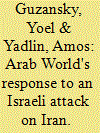

|
|
|
|
|
| Publication |
2013.
|
| Summary/Abstract |
In a television interview in November 2011, former head of Mossad Meir Dagan warned that an Israeli attack on Iran's nuclear facilities could lead to a regional war involving actors such as Hizbullah, Hamas and Syria. Israeli Prime Minister Benjamin Netanyahu has had a different view. In October 2012, he told French magazine Paris Match that such an attack would stabilise the Middle East:
Five minutes after, contrary to what the skeptics say, I think a feeling of relief would spread across the region … Iran is not popular in the Arab world, far from it, and some governments in the region, as well as their citizens, have understood that a nuclear-armed Iran would be dangerous for them, not just for Israel.
US officials, however, predict that Arab states would have a strong reaction to an independent Israeli attack. Such an assault is likely to sever Israel's already limited diplomatic relations with Arab states, they argue, and may destroy its peace treaties with Egypt and Jordan. Washington believes that an attack would give rise to popular protests in the Arab world, forcing its leaders to act.
|
|
|
|
|
|
|
|
|
|
|
|
|
|
|
|
| 4 |
ID:
122014
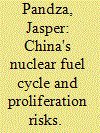

|
|
|
|
|
| Publication |
2013.
|
| Summary/Abstract |
Just days after the March 2011 Fukushima accident, China's State Council suspended approvals of new nuclear power plants and created a range of rigorous measures aimed at improving the country's nuclear-safety provisions. It was not until October 2012 that the council cautiously lifted the ban on new construction. Then-Premier Wen Jiabao announced that all newly approved reactors would need to meet third-generation criteria, meaning that they should have certain advanced inbuilt safety features lacking in most conventional second-generation reactors. China's actions demonstrate a new resolve among its leadership to give greater consideration to the safety, rather than the economic benefits, of nuclear power. Fukushima caused concern that a similar accident in China would put the government's nuclear programme, which is the fastest growing in the world, at serious risk. Of even greater concern was the possibility that an accident could strengthen opposition to the rule of the Communist Party.
|
|
|
|
|
|
|
|
|
|
|
|
|
|
|
|
| 5 |
ID:
122005
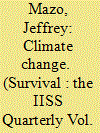

|
|
|
|
|
| Publication |
2013.
|
| Summary/Abstract |
Climate change caused by global warming is, arguably, a serious, even existential, threat to the world order and to the welfare of humanity. No one really knows; there are many uncertainties around the rate of warming and the severity of its environmental and social impacts, and hence the most effective, and cost-effective, ways to avoid or ameliorate them. But over the last five or six years, public discourse has been driven less by policy needs and more by punditry. The propagation of myths and misconceptions, whether deliberate or inadvertent, continues to poison the debate over how to mitigate or adapt to climate change.
|
|
|
|
|
|
|
|
|
|
|
|
|
|
|
|
| 6 |
ID:
122015
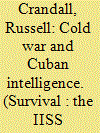

|
|
|
|
|
| Publication |
2013.
|
| Summary/Abstract |
On 25 April 2013, US government judicial officials unsealed an indictment from 2004, charging Marta Rita Velazquez, a former legal officer at the US Agency for International Development (USAID) of spying for the Cuban government. In 2002 Velazquez had prudently fled to Sweden, which does not extradite individuals accused of espionage to the United States because it is considered a political crime.
|
|
|
|
|
|
|
|
|
|
|
|
|
|
|
|
| 7 |
ID:
122016
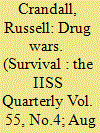

|
|
|
|
|
| Publication |
2013.
|
| Summary/Abstract |
In June 2012, an American drug enforcement agent shot and killed a suspected drug trafficker during a raid on a smuggling operation in Honduras, the impoverished Central American country with the world's highest murder rate. Just a few weeks earlier, Honduran security officials, shadowed by US agents as part of Operation Anvil, accidentally killed four civilians, including two pregnant women, in the country's remote and now drugs-and-thugs-infested Mosquito Coast. These are only some of the more recent murky moments in the decades-long, US-led drug war in Latin America: a conflict that is highly controversial, expensive and far from over. Yet since the 'war on drugs' was launched by US President Richard Nixon in 1971, there have been few episodes in which a US operative on the ground has killed someone as part of the conflict.
|
|
|
|
|
|
|
|
|
|
|
|
|
|
|
|
| 8 |
ID:
122013
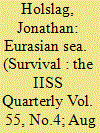

|
|
|
|
|
| Publication |
2013.
|
| Summary/Abstract |
Maritime disputes in Eastern Asia have been sending odd ripples of excitement through Western Europe for the past few years. Experts and policymakers claim that Europe cannot stay aloof. Some speculate that China might cut off trade routes in the event of a conflict and that Europe needs to collaborate with the United States to keep them open. A few go so far as to say that Europe's credibility as a security actor hinges upon the ability to send gunboats to the Pacific, and that it should build on the grand maritime tradition of member states such as the United Kingdom. Others assume that the European model of regional integration could be a way of settling the wrangling over the South China Sea. Maritime disputes in the East are, to be sure, a source of much uncertainty, and could escalate. But is this a reason for Europe to dive into the play pool of the Pacific powers?
|
|
|
|
|
|
|
|
|
|
|
|
|
|
|
|
| 9 |
ID:
122008


|
|
|
|
|
| Publication |
2013.
|
| Summary/Abstract |
In the abundant recent analysis of a nuclearising Iran, scholars and other experts have identified several dangers. The Iranian regime could bully regional rivals, increase its influence in Iraq, further challenge US power in the Gulf and set off a proliferation cascade. Another oft-cited danger is that, protected from retaliation by its nuclear shield, Iran will step up its support for proxy groups in the Middle East. Even without increased backing from Tehran, Hizbullah and Hamas may be emboldened to increase their attacks on Israel, believing that they are covered by an Iranian 'nuclear umbrella'. With a few exceptions, however, most recent analysis fails to explain how Iran would use the bomb to bring about such changes. As outlined by Paul R. Pillar, professor at Georgetown University, most commentary 'links Iran with sundry forms of objectionable behaviour, either real or hypothetical, without explaining what difference the possession of a nuclear weapon would make'. To understand the threats posed by a nuclear-armed Iran, therefore, and to devise policies to avert or mitigate these dangers, we must analyse the causal link between nuclearisation and its potential consequences.
|
|
|
|
|
|
|
|
|
|
|
|
|
|
|
|
| 10 |
ID:
122007


|
|
|
|
|
| Publication |
2013.
|
| Summary/Abstract |
Former Iranian President Mahmoud Ahmadinejad's visit to Cairo on 5 February 2013 was, potentially, an historic event. Iran and Egypt have had decidedly difficult relations since the 1979 Islamic Revolution, mirroring the suspicion with which the Iranian regime has been treated across the region. The advent of an Islamic government in Egypt provided an opportunity to improve the situation. But the visit was a bust. Indeed, relations have, if anything, worsened since the outbreak of fighting in Syria, which has pitted Iran against much of the Arab world once again.
|
|
|
|
|
|
|
|
|
|
|
|
|
|
|
|
| 11 |
ID:
122004
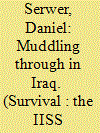

|
|
|
|
|
| Publication |
2013.
|
| Summary/Abstract |
Writing for the Washington Post in April, Iraqi Prime Minister Nuri al-Maliki argued that 'the United States has not "lost" Iraq. Instead, in Iraq, the United States has found a partner for our shared strategic concerns and our common efforts on energy, economics and the promotion of peace and democracy.' A lot of people in the United States do not see it that way. They regard Iraq's democratisation efforts over the course of eight years as wasted. Many Americans view Maliki as increasingly sectarian and authoritarian, and aligned with Iran, especially in his support of Syrian President Bashar al-Assad, an important ally of Tehran. They see little of Iraq's vast oil wealth trickling down to benefit its population. They wonder whether Iraq can survive as a single state as relations between Baghdad and the Kurdistan capital of Erbil deteriorate; Sunnis block major roads in protest against Maliki; the government prevents demonstrations in Baghdad and predominantly Sunni insurgents continue to carry out bombings.
|
|
|
|
|
|
|
|
|
|
|
|
|
|
|
|
| 12 |
ID:
122003
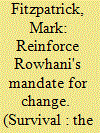

|
|
|
|
|
| Publication |
2013.
|
| Summary/Abstract |
Foreign reactions to Hassan Rowhani's 14 June election as Iran's next president ranged from delight to dismay. A better response is cautious optimism. Rowhani will not be able to solve the nuclear crisis. Nor is he likely to do much that will make it worse than would be the case under any other Iranian leader. But he has a mandate for change and a disposition towards pragmatism which provide a ray of hope.
|
|
|
|
|
|
|
|
|
|
|
|
|
|
|
|
| 13 |
ID:
122010
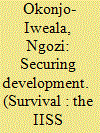

|
|
|
|
|
| Publication |
2013.
|
| Summary/Abstract |
Dr Ngozi Okonjo-Iweala is a renowned development economist and reformer who has served the Nigerian government and World Bank for most of her career. In her current role, Dr Okonjo-Iweala is responsible for managing the finances of Africa's most populous nation and one of the world's fastest-growing economies. She gave the 2013 Oppenheimer Lecture at Arundel House, London, on 19 June 2013.
|
|
|
|
|
|
|
|
|
|
|
|
|
|
|
|
| 14 |
ID:
122002


|
|
|
|
|
| Publication |
2013.
|
| Summary/Abstract |
Back in the 1990s, Ivica Dacic, known as 'Little Slobo', was the spokesman who justified strongman Slobodan Milosevic's conquests of neighbouring non-Serbs in the Balkan wars. Aleksandar Vucic, as the information minister of Yugoslav President Milosevic, was the hatchet man for the media who defended the vast ethnic cleansing by paramilitary police of more than 60% of the 90%-majority Albanians living in the Serbian province of Kosovo. Tomislav Nikolic was the deputy leader of the Serbian Radical Party that berated Milosevic for being too soft and not seizing much more contiguous territory for a Greater Serbia; the party's founder, Vojislav Seselj, would shortly report to The Hague for trial on war-crimes charges.
|
|
|
|
|
|
|
|
|
|
|
|
|
|
|
|
| 15 |
ID:
122006
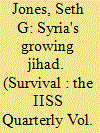

|
|
|
|
|
| Publication |
2013.
|
| Summary/Abstract |
The escalating war in Syria presents a growing threat to the Middle East and the West more broadly. Led by groups like Jabhat al-Nusra (the Victory Front), an al-Qaeda-affiliated organisation, Syria is becoming a training ground for foreign fighters and a microcosm of sectarian conflict. Over the past year, an increasing number of fighters have travelled to Syria from other areas - including the West - in an effort to topple the Assad regime, where some have joined Jabhat al-Nusra and other rebel groups. These fighters are gaining valuable experience in combat, bomb-making, propaganda and counter-intelligence. Most are developing relationships with fighters from other regions - such as the Persian Gulf, North Africa and South Asia - and becoming more ideologically committed. In addition, these ties are being used to transport greater amounts of money, lethal aid and non-lethal material to the Syrian front.
|
|
|
|
|
|
|
|
|
|
|
|
|
|
|
|
|
|
|
|
|